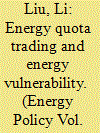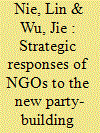|
|
|
Sort Order |
|
|
|
Items / Page
|
|
|
|
|
|
|
| Srl | Item |
| 1 |
ID:
192720


|
|
|
|
|
| Summary/Abstract |
Energy vulnerability has received sustained attention in global energy research related to energy security and poverty. However, energy quota trading (EQT), which aims to reduce energy consumption and intensity, has the potential to impact energy vulnerability substantially. This study scrutinizes the effect of EQT on energy vulnerability using a difference-in-difference model, relying on a quasi-natural experiment of China's EQT pilot. The findings show that EQT can significantly reduce energy vulnerability by 4.2%, which helps improve energy resilience. In addition, EQT can reduce the proportion of coal in energy consumption, thus reducing energy vulnerability. Finally, the ameliorating effect of EQT on energy vulnerability is particularly pronounced in areas with high resource dependence and low marketization. This research not only expands the understanding of the relationship between EQT and energy vulnerability, but also provides valuable assistance for future EQT policies from pilot to full-scale implementation.
|
|
|
|
|
|
|
|
|
|
|
|
|
|
|
|
| 2 |
ID:
169856


|
|
|
|
|
| Summary/Abstract |
the literature proposes that a booming minerals sector leads to a development curse. The mineral markets in China experienced a prolonged boom over the period of 2000–2010. We empirically examine the effects of mineral resources on employment in county economies during the boom. We consider the endogeneity of the resource measure and employ an instrumental variables approach to resolve the problem. We find the mining boom exerts a significant “crowding out” effect on the manufacturing employment in mineral-resource-dependent counties, but benefits the employment in services. Because the increase in mining employment is sizeable in a mining boom, the overall employment in the resource-dependent counties has shown a small growth. These results are robust to alternative samples. Our findings confirm the argument that resource booms undermine manufacturing sectors through deindustrialization effects, though little evidence shows the existence of a resource curse in overall employment. We conclude that for a developing economy with rich mineral resources and a large population, it would be hard to following the road of industrialization relying on manufacturing.
|
|
|
|
|
|
|
|
|
|
|
|
|
|
|
|
| 3 |
ID:
184087


|
|
|
|
|
| Summary/Abstract |
Over the last decade, the Chinese Communist Party (CCP) has sought to assimilate the third sector – non-governmental organizations (NGOs) – through its party-building campaign. This article examines NGOs’ strategies in response to this campaign, based on in-depth interviews with 64 NGOs and local cadres. We find that NGOs have developed three main strategies to respond to the CCP’s attempts to penetrate their organizations. First, NGOs embedded in the party-state system and those affiliated with private enterprises tend to acquiesce to party building out of habit and for compliance reasons, respectively. Second, those with multiple stakeholders generally compromise in the party-building process, acting as passive compliers if they depend more on non-state resources, or active players if they rely more on state resources. Third, civic NGOs that advocate causes inconsistent with the ruling regime might avoid party building as a resistant strategy, by either disguising their nonconformity or escaping from the control of the ruling regime entirely. NGOs’ strategic responses are contingent on their negotiating power, which results from their resource dependence and the party’s enforcement dilemmas. This article contributes to our understanding of the recent party-building campaign from an institutional perspective, and enriches our knowledge about relations between the party and the third sector.
|
|
|
|
|
|
|
|
|
|
|
|
|
|
|
|
| 4 |
ID:
179717


|
|
|
|
|
| Summary/Abstract |
Urban industrial transformation is crucial for resource-based cities to break through the lock-in effect of natural resources dependence and achieve economic, environmental and energy sustainability. This paper proposes a rough set-based rule mining technique of learning, validation and generalisation to identify what influential factors, under which synergetic combination methods and influencing levels lead to successful industrial structural transformation in resource-based cities. The extracted decision rules reveal the transformation patterns from the rationalisation and optimisation of industrial structure, as well as the potential path transmission mechanism that help prevent the negative effects of resource dependence. The results from China's 115 resource-based cities during 2004–2017 show resource curses that may hinder industrial structural transformation are not absolute existence but conditional appearance. Abundant resources in superior urban transformation cases promote the rationalisation and optimisation of industrial structure by driving material and human capital investment under a reasonable government policy intervention. However, resource dependence squeezes out the technological innovation and marketing competition for developing private enterprises, challenging transformations that improve resource allocation efficiency based on marketisation. The identified patterns inspire policy-makers to adjust urban industrial structure through developing urban resource advantages and bypassing insufficiencies in historical transformation.
|
|
|
|
|
|
|
|
|
|
|
|
|
|
|
|
|
|
|
|
|